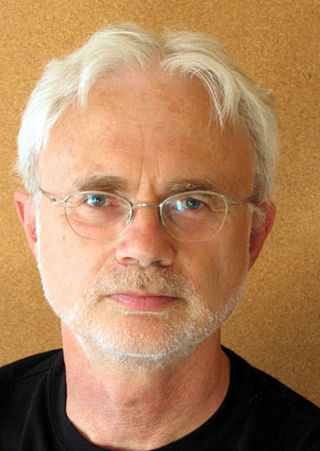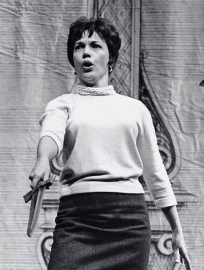Related Research Articles
Mefistofele is an opera in a prologue and five acts, later reduced to four acts and an epilogue, the only completed opera with music by the Italian composer-librettist Arrigo Boito. The opera was given its premiere on 5 March 1868 at La Scala, Milan, under the baton of the composer, despite his lack of experience and skill as a conductor.

The San Francisco Opera (SFO) is an American opera company founded in 1923 by Gaetano Merola (1881–1953) based in San Francisco, California.

Dialogues des Carmélites, FP 159, is an opera in three acts, divided into twelve scenes with linking orchestral interludes, with music and libretto by Francis Poulenc, completed in 1956. Poulenc wrote the libretto for his second opera after the work of the same name by Georges Bernanos. This is a fictionalized version of the story of the Martyrs of Compiègne, Carmelite nuns who, in 1794 during the closing days of the Reign of Terror during the French Revolution, were guillotined in Paris for refusing to renounce their vocation.

La Gioconda is an opera in four acts by Amilcare Ponchielli set to an Italian libretto by Arrigo Boito, based on Angelo, Tyrant of Padua, a 1835 play in prose by Victor Hugo.

Michael Korie is an American librettist and lyricist whose writing for musical theater and opera includes the musicals Grey Gardens and Far From Heaven, and the operas Harvey Milk and The Grapes of Wrath. His works have been produced on Broadway, Off-Broadway, and internationally. His lyrics have been nominated for the Tony Award and the Drama Desk Award, and won the Outer Critics Circle Award. In 2016, Korie was awarded the Marc Blitzstein Award from the American Academy of Arts and Letters.

El Niño is an opera-oratorio by the contemporary American composer John Adams. It was premiered on December 15, 2000, at the Théâtre du Châtelet in Paris by soloists Dawn Upshaw, Lorraine Hunt Lieberson and Willard White, the vocal ensemble Theatre of Voices, the London Voices, La Maîtrise de Paris, and the Deutsches Symphonie-Orchester Berlin, with Kent Nagano conducting. It has been performed on a number of occasions since, and has been broadcast on BBC Television.

Antony and Cleopatra, Op. 40, is an opera in three acts by American composer Samuel Barber. The libretto was prepared by Franco Zeffirelli. It was based on the play Antony and Cleopatra by William Shakespeare and made use of Shakespeare's language exclusively.

Blanche Thebom was an American operatic mezzo-soprano, voice teacher, and opera director. She was part of the first wave of American opera singers that had highly successful international careers. In her own country she had a long association with the Metropolitan Opera in New York City which lasted 22 years. Opera News stated, "An ambitious beauty with a velvety, even-grained dramatic mezzo, Thebom was a natural for opera: she commanded the stage with the elegantly disciplined hauteur of an old-school diva, relishing the opportunity to play femmes du monde such as Marina in Boris Godunov, Herodias and Dalila."

Christopher Keene was an American conductor.

Beverly Wolff was an American mezzo-soprano who had an active career in concerts and operas from the early 1950s to the early 1980s. She performed a broad repertoire which encompassed operatic and concert works in many languages and from a variety of musical periods. She was a champion of new works, notably premiering compositions by Leonard Bernstein, Gian Carlo Menotti, Douglas Moore, and Ned Rorem among other American composers. She also performed in a number of rarely heard baroque operas by George Frideric Handel with the New York City Opera (NYCO), the Handel Society of New York, and at the Kennedy Center Handel Festivals.
Jean Kraft was an American operatic mezzo-soprano. She began her career singing with the New York City Opera (NYCO) during the early 1960s, after which she embarked on a partnership with The Santa Fe Opera from 1965 through 1987. In 1970 she joined the roster of singers at the Metropolitan Opera in New York City where she remained a fixture until 1989. She also performed as a guest of many other opera companies throughout the United States. In 2005 Opera News called her "a gifted mezzo and observant, imaginative actress who lent distinction to a wide range of character roles. By the end of her Met tenure, she had sung nearly 800 performances and become a solid audience favorite."

Arnold Voketaitis is an American bass-baritone of Lithuanian descent who had an active singing career performing in operas, concerts, and recitals from the late 1950s through the 1990s. He enjoyed a particularly successful partnership with the New York City Opera and has performed with most of the major opera companies in North America. A strong actor, he has a powerful voice with a wide range and fine timbre.
Lee Venora is an American operatic soprano and musical theater actress. She was highly active with the New York City Opera between 1957 and 1967 and a regular performer at the San Francisco Opera between 1961 and 1966. She also appeared in a few Broadway musicals, Lincoln Center revivals, and national tours of musicals during her career. Composer and conductor Leonard Bernstein was an admirer of her voice, and she performed with him and the New York Philharmonic on a number of occasions during the late 1950s and early 1960s. She also sang with the orchestra on a couple of recordings and appears on a few musical recordings as well.
James McCray was an American operatic tenor and voice teacher.

Herbert Grossman was an American conductor who was chiefly known for his work within opera and musical theatre.
Gallantry is a one-act opera by composer Douglas Moore. The work is a parody of soap opera, complete with sung commercial interruptions. The work uses an English-language libretto by Arnold Sundgaard.
David Anthony Stuart Atkinson was a Canadian baritone and New York Broadway actor/singer. Most of his career was spent performing in musicals and operettas in New York City from the late 1940s through the early 1970s, although he did appear in some operas and made a few television appearances. In 1952 he created the role of Sam in the world premiere of Leonard Bernstein's Trouble in Tahiti. From 1956-1962 he was a leading performer at the New York City Opera where he starred in several musicals and appeared in the world premieres of several English language operas. His greatest success on the stage came late in his career: the role of Cervantes in Man of La Mancha which he portrayed in the original Broadway production, the 1968 national tour, and in the 1972 Broadway revival.
Herbert Wilson Beattie was an American operatic bass and voice teacher.
The (R)evolution of Steve Jobs is an opera with music by American composer Mason Bates and an English-language libretto by Mark Campbell. It was commissioned by Santa Fe Opera, Seattle Opera, San Francisco Opera, the Jacobs School of Music at Indiana University, with support from Cal Performances. The opera is about Steve Jobs, one of the most influential people in recent history; it is set at a time when he must confront his own mortality and circle back on the events that shaped his personal and professional life.
The Devil and Daniel Webster is a folk opera in one act by American composer Douglas Moore. The opera's English-language libretto was written by Stephen Vincent Benét who also penned the 1936 short story of the same name upon which the work is based.
References
- ↑ The Later Diaries of Ned Rorem, p. 253, San Francisco: North Point Press, 1983
- ↑ Theodore Strongin (April 30, 1966). "Opera By Moore Bows In Kansas; 'Carry Nation' Intertwines Love Story and Legend" (PDF). The New York Times .
- ↑ "Carry Nation" (PDF). San Francisco Opera Archives.
- ↑ Harold C. Schonberg (March 29, 1968). "Opera: The Folk Heritage of a Young Carry Nation in Missouri; Local Premiere Given Moore-Jayme Work". The New York Times.
- ↑ Raymond Ericson (January 26, 1969). "Behind Carry Nations Hatchet" (PDF). The New York Times.